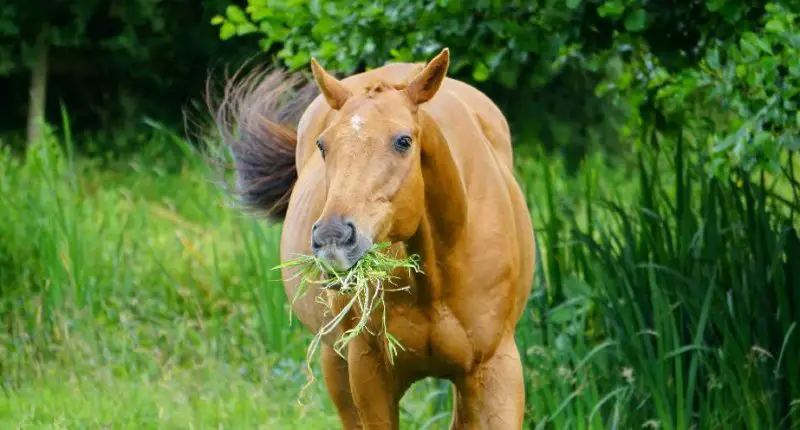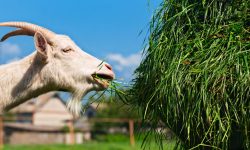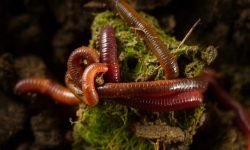Horses are some of the most magnificent and hardworking animals on Earth, known for their strength, grace, and intelligence. Whether galloping across open fields or helping humans on farms, their health and energy depend entirely on what they eat. A balanced diet is essential for maintaining their endurance, glossy coats, and calm temperament.
In the wild, horses spend most of their time grazing on grasses and plants, consuming small amounts throughout the day. Domesticated horses, however, often rely on a combination of hay, grains, and supplements to stay nourished and active. Understanding what horses eat helps owners mimic their natural feeding habits as closely as possible.
Because horses have sensitive digestive systems, knowing which foods are beneficial — and which are harmful — is vital. A proper diet not only supports their physical strength but also improves mood, stamina, and longevity. From lush green grass to fresh fruits and grains, horses enjoy a surprisingly diverse menu.
Understanding the Horse Diet

Horses are natural herbivores with digestive systems designed for steady grazing rather than large meals. Their stomachs produce acid continuously, so they must eat small portions of fibrous food throughout the day to stay healthy. This constant feeding helps maintain gut bacteria, prevent ulcers, and reduce the risk of colic.
In the wild, horses survive on grasses, herbs, and shrubs that provide the right mix of fiber, vitamins, and minerals. Domesticated horses rely on hay, grains, and mineral supplements to mimic that same nutrition. A balanced combination of these foods ensures strong muscles, steady energy, and a healthy digestive system.
The Natural Grazing Habit
Horses are built to graze for many hours each day. Their natural behavior is to move slowly while eating small bites of grass and plants. This helps them stay calm, maintain a healthy gut rhythm, and avoid digestive problems caused by long fasting periods.
Owners can support this instinct by allowing horses to access pastures regularly or by offering hay throughout the day. Consistent grazing also keeps horses mentally relaxed and reduces stress-related habits such as cribbing or pacing.
Nutrition and Hydration Balance
A horse’s diet must include fiber for digestion, protein for growth, and minerals like calcium and phosphorus for bone strength. Moderate carbohydrates and fats provide energy for work and movement. These elements work best when combined in a natural, steady feeding schedule.
Clean, fresh water is equally important. Horses can drink 5–10 gallons daily depending on temperature and activity. Proper hydration helps digestion, temperature control, and overall stamina.
Maintaining a routine feeding schedule and providing a variety of forages keeps horses healthy, strong, and naturally balanced — just as they would be in the wild.
20 Foods Horses Love the Most
1. Grass
Grass is the foundation of a horse’s diet and the most natural food they can eat. It provides the roughage needed to keep the digestive tract functioning properly. Horses instinctively graze for most of the day, preferring young, tender shoots that are high in moisture and easy to chew.
Different pasture grasses, including timothy, ryegrass, orchard grass, and fescue, contain a balance of vitamins A, E, calcium, and natural carbohydrates. These nutrients promote strong bones, shiny coats, and steady energy levels without overloading the digestive system.
Allowing horses to graze freely on clean, pesticide-free pastures also supports their mental well-being. It reduces stress and boredom, encouraging natural foraging behavior that keeps them physically and emotionally balanced.
2. Hay
Hay is an indispensable part of every horse’s diet, particularly in winter or dry seasons when fresh grass is scarce. It provides consistent fiber intake that keeps the gut moving and prevents colic or other digestive issues.
High-quality hay, such as timothy, clover, or alfalfa, is rich in protein, minerals, and essential nutrients. Alfalfa hay is especially beneficial for lactating mares or growing foals due to its calcium and protein content.
Hay must always be stored properly — clean, dry, and free of mold. Dusty or damp hay can cause respiratory irritation or gastrointestinal upset, both of which can seriously impact a horse’s health.
3. Alfalfa
Alfalfa is one of the most nutrient-dense forages available to horses. It provides high levels of calcium, protein, and energy, supporting muscle growth and bone health. Its soft leaves and sweet flavor make it one of the most palatable forages for horses.
This legume is particularly useful for working horses, pregnant mares, and underweight individuals who need a calorie boost. Alfalfa also helps maintain energy during strenuous activity or cold weather.
However, it should be offered in moderation and balanced with grass hay. Too much alfalfa can lead to excess calcium intake and weight gain in horses with lower activity levels.
4. Grains
Grains like oats, barley, and corn provide concentrated energy that fuels performance horses or those with high caloric needs. Each type offers unique benefits: oats are rich in fiber, barley has moderate starch, and corn delivers a dense energy punch.
Grains are best served crushed, rolled, or steamed to improve digestibility. Mixing them with bran or molasses enhances texture and flavor while preventing dust inhalation.
Overfeeding grains can upset the natural gut balance and lead to laminitis or obesity. Therefore, they should always supplement — not replace — roughage-based diets.
5. Carrots
Carrots are among the most iconic horse treats, valued for their sweet flavor and satisfying crunch. They’re naturally low in calories but high in beta-carotene, a nutrient that supports eye health and boosts immune function.
Sliced or shredded carrots make excellent training rewards, encouraging positive behavior while providing hydration through their moisture content. Horses find them irresistible, making them perfect as a natural incentive.
However, moderation is key. Feeding too many carrots can increase sugar levels in the diet, especially for horses prone to metabolic disorders.
6. Apples
Apples are refreshing, nutritious, and hydrating — a favorite for nearly every horse. They provide vitamins A and C, natural sugars, and fiber that support digestive function and boost energy.
Whether offered whole or sliced, apples are a safe and fun way to enrich feeding time. Their crisp texture promotes chewing, which in turn produces saliva that aids digestion and reduces ulcer risk.
Owners should always remove seeds and cores before feeding. Apple seeds contain small amounts of cyanide, which can be harmful in large quantities.
7. Vegetables
Vegetables are excellent dietary supplements for horses, offering fiber, hydration, and a range of vitamins and minerals. Root vegetables like beets, parsnips, and turnips are rich in natural energy and antioxidants.
Leafy vegetables such as spinach, kale, and lettuce provide essential nutrients that support coat shine, hoof health, and immune strength. They also encourage chewing, which helps maintain dental wear.
Avoid feeding potatoes, onions, or garlic, as they can be toxic. Introduce vegetables slowly to prevent digestive upset, especially for horses with sensitive stomachs.
8. Fruits
Fruits such as pears, bananas, watermelon, and berries are delicious, hydrating treats that horses love. They contain antioxidants, natural sugars, and vitamins that help maintain vitality and overall wellness.
Watermelon slices are especially useful in summer, providing hydration and electrolytes in hot weather. Bananas supply potassium, which supports muscle function.
As with most treats, fruits should be given in small amounts. Overconsumption can cause imbalances in blood sugar or excess calorie intake.
9. Salt and Minerals
Salt is an essential part of every horse’s nutrition, vital for fluid balance, nerve function, and muscle performance. Without adequate salt, horses can suffer from dehydration and fatigue.
Providing mineral blocks or loose salt mixes ensures that horses meet their sodium, calcium, and phosphorus requirements. These nutrients contribute to strong bones and proper hydration.
In hot climates or after strenuous exercise, salt supplementation helps replace electrolytes lost through sweat, keeping horses healthy and alert.
10. Oats
Oats are the traditional grain of choice for horses. They’re easy to digest, high in energy, and balanced in fiber, making them a perfect feed for active and performance horses.
The natural husk of oats provides roughage that helps maintain digestive health. Rolled or crushed oats are gentler on the stomach than whole oats and mix well with other grains.
Feeding oats in moderate quantities ensures sustained energy without overwhelming the digestive system or causing spikes in blood sugar.
11. Beet Pulp
Beet pulp is a high-fiber, low-sugar feed that provides excellent energy for horses without the risks associated with grain-heavy diets. It’s especially beneficial for senior horses or those recovering from illness.
When soaked in water, beet pulp becomes soft and easy to chew, preventing choking and improving hydration. It’s a great way to maintain weight and gut health in older horses.
Mixed with hay or pellets, beet pulp adds bulk and calories without straining digestion, making it one of the most versatile supplemental feeds.
12. Bran
Bran, usually derived from wheat or rice, is a fiber-rich food that promotes healthy bowel movement and improves gut motility. It’s also a warming, comforting feed during winter months.
Many owners prepare bran mash by mixing it with warm water, creating a palatable, aromatic treat that horses love. This can help encourage hydration on cold days.
However, bran should be fed sparingly to prevent calcium-phosphorus imbalance, which can affect bone density over time.
13. Herbs
Herbs such as chamomile, mint, parsley, and dandelion add flavor, aroma, and therapeutic benefits to a horse’s diet. Chamomile soothes nerves, mint stimulates appetite, and parsley supports kidney health.
Herbs are also rich in trace minerals and antioxidants, strengthening immune response and aiding detoxification.
Offering fresh herbs or adding dried ones to feed mimics the natural browsing habits of wild horses, enhancing both nutrition and enrichment.
14. Clover
Clover is a common forage in many pastures and a favorite among horses. It provides high-quality protein, calcium, and minerals that support muscle tone and lactation in mares.
Both red and white clover varieties are soft, flavorful, and easy to digest. Horses often choose clover over regular grass due to its sweet taste and tender leaves.
While beneficial, excessive clover intake can lead to bloating or excessive salivation. Maintaining a mixed pasture ensures nutritional balance.
15. Barley
Barley is an excellent grain for working or underweight horses due to its high energy and moderate starch levels. It provides sustained strength for horses involved in labor or sports.
Feeding crushed or soaked barley improves digestibility and reduces the risk of digestive issues like colic. Its mild flavor makes it easily accepted by most horses.
Barley can be combined with oats or bran for a more balanced, energy-efficient feeding routine.
16. Timothy Hay
Timothy hay is a staple forage choice, prized for its ideal balance of protein, fiber, and digestibility. It promotes gut health and prevents obesity due to its moderate calorie content.
Its coarse texture encourages chewing, stimulating saliva that buffers stomach acid and prevents ulcers.
Timothy hay is especially suitable for adult and sedentary horses, keeping their digestive system active without adding unnecessary calories.
17. Molasses
Molasses adds a natural sweetness and moisture that improves the taste of dry feed mixtures. Horses love its aroma and flavor, which also encourages fussy eaters.
It provides fast-releasing energy that can benefit hard-working or underweight horses.
However, molasses is high in sugar and should be offered sparingly to avoid metabolic issues or excessive calorie intake.
18. Lucerne
Lucerne, another name for alfalfa in many regions, is a premium-quality forage packed with calcium, fiber, and vitamins. It supports muscle recovery and milk production in mares.
Its soft texture and rich aroma make it one of the most palatable feeds available. When mixed with timothy hay, it creates an excellent nutritional balance.
However, too much lucerne can lead to mineral imbalance, so it should complement, not replace, grass-based forages.
19. Horse Pellets
Horse pellets are commercial feeds designed to deliver balanced nutrition in a convenient form. They contain a mix of grains, proteins, minerals, and vitamins to ensure complete dietary support.
Pellets are ideal for horses that lack consistent access to pasture or have specific dietary needs. They’re formulated to promote muscle growth, energy, and overall vitality.
Despite their convenience, pellets should always accompany natural forage to maintain digestive health and prevent boredom.
20. Fresh Water
Water is the most crucial element of any horse’s diet. It aids digestion, regulates body temperature, and facilitates nutrient absorption.
Depending on size, activity, and climate, an adult horse may consume 5–10 gallons daily. Insufficient water can cause dehydration, constipation, or colic.
Providing constant access to clean, cool, and fresh water is essential for maintaining health, especially in hot or dry weather.
FAQs About What Horses Eat
What should horses never eat?
Horses should never eat chocolate, onions, potatoes, garlic, or moldy food. These can be toxic and cause severe digestive or neurological issues.
How often do horses eat each day?
Horses naturally graze throughout the day. Ideally, they should have access to forage almost constantly to maintain gut health and prevent boredom.
Can horses eat human food?
Some fruits and vegetables are safe, but processed foods, sugary snacks, and salty items should always be avoided.
Do horses need supplements?
Most horses get adequate nutrition from hay, pasture, and grains. However, supplements like minerals or vitamins may be beneficial for performance or older horses.
Conclusion
Horses are gentle herbivores with diverse appetites that reflect their natural grazing instincts. A balanced diet based on grass, hay, and nutrient-rich supplements keeps them strong, active, and happy.
From sweet apples to hearty oats, each food has a purpose — providing energy, fiber, or hydration. The key to a healthy horse diet is moderation, variety, and consistency.
By understanding what horses eat and tailoring their meals accordingly, owners can ensure their companions live long, vibrant, and healthy lives.






